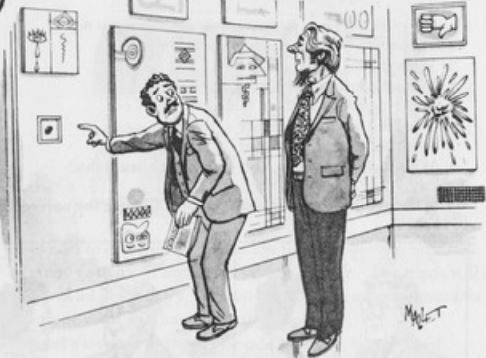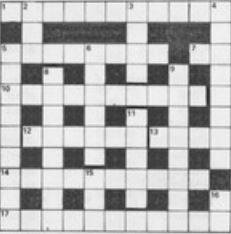
Smallest painting
 المؤلف:
L.A Hill
المؤلف:
L.A Hill
 المصدر:
Advanced steps to understanding
المصدر:
Advanced steps to understanding
 الجزء والصفحة:
62-1
الجزء والصفحة:
62-1
 10/9/2022
10/9/2022
 1408
1408

Mr. Robison won a lot of money on the football pools, but he did not know what the best thing to do with it would be, so he went to a friend who knew a lot about money matters.
This friend said to him, 'Go and buy some modern paintings. Their value goes up every year.
Mr. Robinson went to a good art shop and looked at some modern paintings. He did not understand them at all, and thought that they were terrible and also very expensive.
At last he saw a small picture which did not have a price on it. It was square and white, and had a black spot in the middle, and a narrow brass frame. Mr. Robinson liked it better than any of the others in the shop. 'How much is this one?" he said to the shopkeeper,
That, sir,' answered the shopkeeper, 'is the electric light switch.'
A Which of these sentences are true (T) and which are false (F)? Write T or F in the boxes.
- Mr. Robinson knew a lot about money matters.
- His friend advised him to buy modern pictures because they increased in value every year.
- Mr. Robison did not like the modern paintings he saw.
- He found them very expensive.
- He saw a small picture which was very cheap.
- The shopkeeper said it was a modern painting of an electric light switch.
B Answer these questions.
- How did Mr. Robinson become rich?
- What advice did he want from his friend?
- What was his friend's advice?
- What did Mr. Robinson think about the paintings in the shop?
- What was the picture that he finally chose like?
- What did Mr. Robinson think of it?
- What did he ask the shopkeeper?
- And what did the shopkeeper answer?
C Do the puzzle.
Across:
1. An extremely good picture.
5. Mr. Robinson’s money came from the … pools.
7. If you want to go past a person politely, you should first say, ‘Excuse…’
10. Sensible.
12. 
13. 
14. Afraid.
17. See 4.down.
Down:
2. If this year is 1981, it was 1979 two years…
3. Not dark.
4. And 17. Across. Mr. Robinson thought this was a picture.
5. Having trouble remembering.
6. The frame of this picture is …
8. Mr. Robinson wanted to buy a modern…
9. Least dirty.
11. Less old.
15. 
16. People sometimes say this when they are surprised.

 الاكثر قراءة في Advanced
الاكثر قراءة في Advanced
 اخر الاخبار
اخر الاخبار
اخبار العتبة العباسية المقدسة


